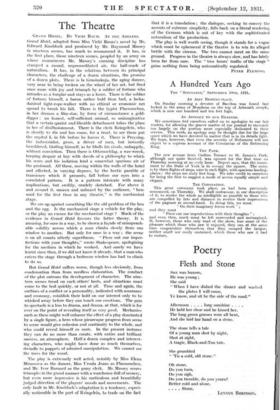The Theatre
GRAND HOTEL. BY VICKI BAUM. AT THE ADELPHI.
Grand Hotel, adapted from Miss Vicki Baum's novel by Mr. Edward Knoblock and produced by Mr. Raymond Massey in nineteen scenes, has much to recommend it. It has, in the first place, those nineteen scenes, peopled by an army on whose manoeuvres Mr. Massey's cunning discipline has stamped a casual, unpremeditated air, the hall-mark of naturalism. It has, in the relations between its principal characters, the challenge of a dozen situations, the promise of a dozen plots. There is In Grusinskaja, the aging dancer, very near to being broken on the wheel of her art, but fired once more with joy and triumph by a soldier of fortune who intrudes as a burglar and stays as a lover. There is the soldier of fortune himself, a baron rather bold than bad, a lacka- daisical tight-rope-walker with no ethical or economic net spread to break his fall. There is the typist Flaemmehen, in her dreams a film-star, by force of circumstance a gold- digger : an honest, self-sufficient • animal, so unimaginative that a certain quaint and likeable detachment takes the place in her of disillusionment. There is the clerk Kringelein, who is shortly to die and has come, for a treat, to see them put the capital L in life before he leaves it. There is Preysing, the industrialist, gross, a driver of men, but inwardly bewildered, bluffing himself, as he bluffs his rivals, unhappily, without conviction. Then there is Otternschlag, a war-wreck, keeping despair at bay with shreds of a philosophy to which his scars and his isolation lend a somewhat spurious air of the profound. All these, moving within the walls of the hotel and affected, in varying degrees, by the hectic parable of transience which it presents, fall before our eyes into a correlated pattern. It is a pattern intricate with many implications, but swiftly, crudely sketched. For above it and around it, unseen and unheard by the audience, " here used for the first time in any theatre," is the mechanical stage.
We are up against something like the old problem of the hen and the egg. Is the mechanical stage a vehicle for the play, or the play an excuse for the mechanical stage ? Much of the evidence in Grand Hotel favours the latter theory. It is amusing, for once in a way, to be shown a facade of unimpeach- able solidity across which a man climbs slowly from one window to another. But only for once in a way ; the scene is on all counts utterly superfluous. Piece out our imper- fections with your thoughts," wrote Shakespeare, apologizing for the medium in which he worked. And surely we have learnt since then, if we did not know it already, that a man who enters the stage through a bedroom window has had to climb to do so.
But Grand Hotel suffers worse, though less obviously, from condensation than from needless elaboration. The conduct of the plot outruns the development of character. The nine- teen scenes tread on each others' heels, and situations must come to the boil quickly, or not at all. Time and again, the outlines of a conflict or a personality, indicated with assurance and economy, establish their hold on our interest only to be whisked away before they can touch our emotions. The gain to spectacle is a loss to drama, and drama, at that, which is for ever on the point of revealing itself as very good. Mechanics such as these might well enhance the effect of a play dominated by a single figure, a hero whose picaresque progress from scene to scene would give cohesion and continuity to the whole, and who could reveal himself en route. In the present instance they can do no more than create, with entire and brilliant success, an atmosphere. Half a dozen complex and interest- ing characters, who might have done as much themselves, dwindle to puppets of admired manipulation. We cannot see the trees for the wood.
The play is extremely well acted, notably by Miss Elena Miramova as the dancer, Miss 'Ursula Jeans as Flaemmchen, and Mr. Ivor Barnard as the puny clerk. Mr. Massey scores triumphs in the grand manner with a warehouse-full of scenery, but even more impressive is his meticulous and beautifully judged direction of the players' moods and movements. The only fault in Mr. Knoblock's adaptation is a tendency, especi- ally noticeable in the part of Kringelein, to trade on the-fact
that it is a translation ; the dialogue, seeking to convey the accents of extreme simplicity, falls back on a literal rendering of the German which is out of key with the sophisticated naturalism of the production.
The play is well worth seeing, though it stands for a vogue which must be ephemeral if the theatre is to win its alleged battle with the cinema. The two cannot meet on the same ground. Progress in the theatre is always slow, and has lately been far from sure. The " two hours' traffic of the stage " gains nothing from being automatically regulated.
PETER FLEMING.






























 Previous page
Previous page